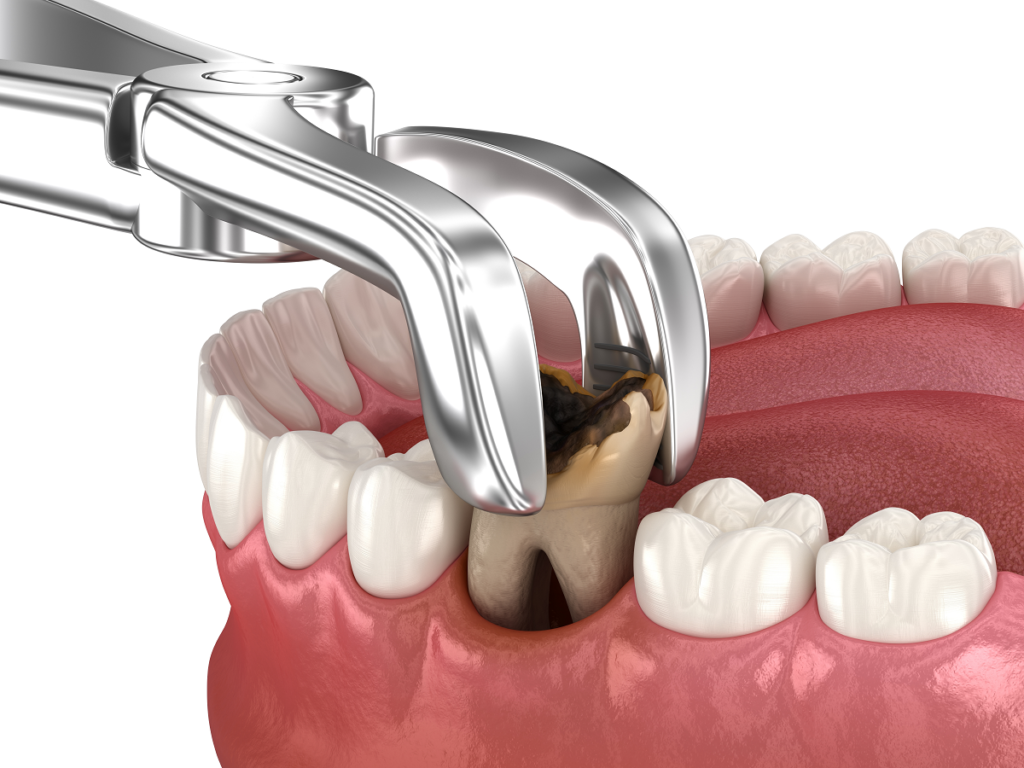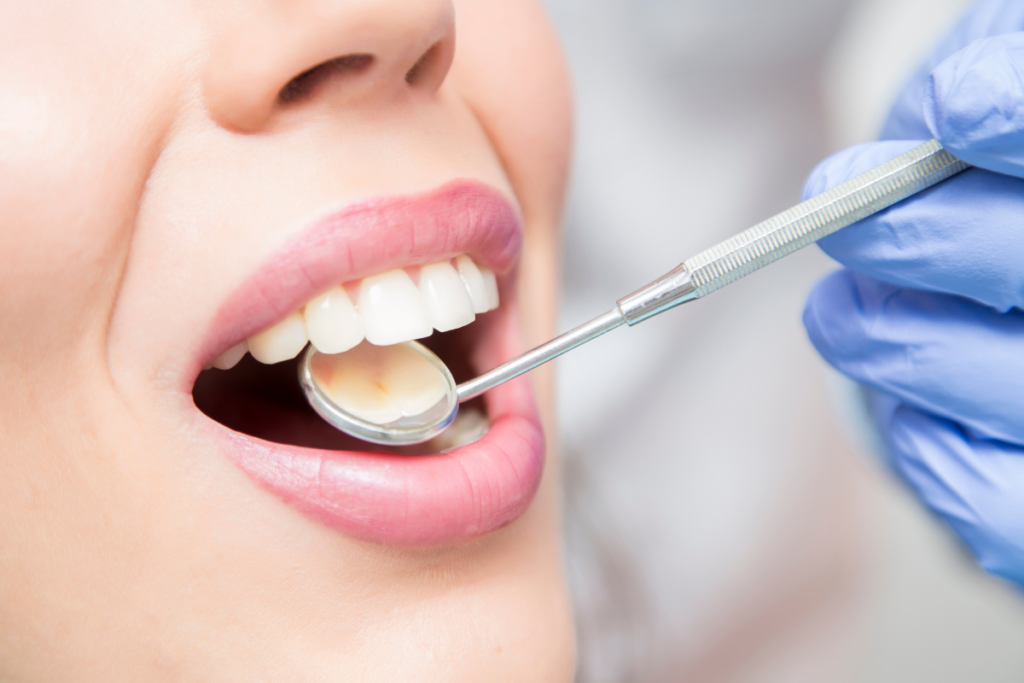Tooth extractions may be necessary for patients with severely decayed or cracked teeth, dental crowding, or dental trauma. Tooth extraction refers to the process of extracting a tooth from its position within the jawbone socket. If you need a tooth extraction in Naples, FL, please contact Naples Dental Boutique today to book an appointment.


You might need to have a tooth removed for many different reasons, which include but aren’t limited to:
• Gum disease (periodontal disease)
• Severe tooth decay
• Crowded teeth – If your teeth don’t have enough space in the jaw
• Abscess (collection of pus) around the teeth or on your gums
• A broken tooth that cannot be repaired
• Impacted wisdom teeth.
Tooth extraction, just like any dental procedure, is performed by a certified dentist or oral surgeon. Advances in modern medicine have made it a relatively quick and painless outpatient procedure done with general, local, or IV anesthesia.
Here are the exact steps taken in a tooth extraction:
Step 1: Numbing the tooth by administering an anesthetic injection to numb the tooth, bone, and gum tissue surrounding it.
Step 2: Extraction of the tooth: The dentist will remove the tooth from its socket using extraction forceps and elevators.
Step 3: Closing the space vacated by the tooth: Once the tooth has been removed, the dentist will clean the area to remove all bone spurs and fragments.
Step 4: Controlling bleeding and swelling: A gauze will then be placed over the tooth extraction site, and you will be asked to bite down on it to create firm pressure and get the bleeding under control. You may also be given an ice pack on your cheek to reduce swelling and inflammation.
Step 5: Post-extraction care: Following the tooth extraction, you must take care of the extraction site to ensure proper healing.
Remember that tooth extraction is ideal for infected, decayed, or crowded teeth. Impacted, broken, or misaligned teeth growing below the surface of the gums, however, may require a more invasive procedure to fix.
Our dentists at Naples Dental Boutique will explain how to prepare for the procedure. They will ask about your medical and dental history. You should inform them about any allergies, medical conditions, recent surgery, and any medicines you are taking.
Our dentists will discuss with you what will happen before, including any pain you might experience. If you aren’t sure about anything, ask. No question is too small. If you’re fully informed, you will feel more at ease, allowing you to consent for the procedure to move forward.
Our dentists may offer you one of several replacement options to fill the gap where the tooth used to be, depending on which tooth was removed. Common options include a permanent dental implant or oral prosthetics (such as a bridge or dentures).

Our dentists at Naples Dental Boutique may opt for a simple or surgical extraction depending on the condition requiring a dental extraction procedure. Our dentists will check whether the tooth is impacted or visible. Below is a more detailed explanation of both procedures.
The dentist may administer a combination of IV and local anesthesia to numb the area and put you to sleep or general anesthesia if you have any pre-existing conditions. Once these have been safely administered, the oral surgeon or dentist will cut into the affected gum with a tiny incision and may even cut the tooth or remove the surrounding bone to extract it.
A local anesthetic is first administered to numb the affected area. During the procedure, all you will feel is no pain and light pressure. The dentist will then loosen the affected tooth from its socket using an elevator and remove it using forceps.
DO NOT DISTURB THE AREA: For the next few days, and especially the first 24 hours, it is very important to allow your body to form a good clot and start the natural healing process. Swishing, sucking through a straw, and smoking can all dislodge the clot. Keep anything sharp from entering the wound (crunchy food, toothpicks, eating utensils). Be sure to chew on the opposite side for 24 hours.
BLEEDING: When you leave the office, you might be biting on a gauze pad to control bleeding. Keep slight pressure on this gauze for at least 30 minutes. Don’t change it during this time; it needs to remain undisturbed while a clot forms in the extraction socket. After 30 minutes you may remove it.
You may bite on another gauze or a tea bag for another 30 minutes if you feel it is still bleeding. Small amounts of blood in the saliva can make your saliva appear quite red. This is normal and may be noticed the rest of the day after the procedure.
SMOKING: Smoking should be stopped following surgery. Healing and success of the surgery will be substantially reduced by the cigarette smoke chemicals in your body. Also the suction created when inhaling cigarettes can dislodge the clot. Smokers are at greater risk of developing a painful Dry Socket.
PAIN: Some discomfort is normal after surgery. To minimize pain, Take two Tylenol, Nuprin, Advil, or similar non-aspirin pain reliever every 3 to 4 hours until bedtime to maintain comfort. Take it before the anesthesia wears off. If prescription pain medication is prescribed, take it as instructed on the label.
Don’t exceed the dose on the label. Taking with food or milk will help reduce upset stomach. Avoid driving or operating heavy machinery when taking pain prescriptions. Do not drink alcohol while taking prescription pain medications.
NAUSEA: This is most often caused by taking pain medications on an empty stomach. Reduce nausea by preceding each pain pill with soft food, and taking the pill with a large glass of water.
SWELLING: Applying an ice bag to the face over the operated area will minimize swelling. Apply for 15 minutes, then remove for 15 minutes. Continue this for the first day.
NUMBNESS: The local anesthetic will cause you to be numb for several hours after you leave the office. Be very careful not to bite, chew, pinch, or scratch the numb area. Sometimes the extraction causes residual numbness or tingling for six weeks or longer.
BRUSHING: Do not brush your teeth for the first 8 hours after surgery. After this, you may brush your teeth gently, but avoid the area of surgery for 3 days.
RINSING: Please begin gentle rinsing with a saltwater solution (1/2 teaspoon salt + 8 ounces warm water). Avoid commercial mouth rinses like Listerine or Peroxide.
DIET: Eat soft foods for the first two days. Maintain a good, balanced diet. Return to normal regular meals as soon as you are able after the first two days. Drink plenty of water. Avoid alcohol for 48 hours.
ACTIVITY: After leaving the office, rest and avoid strenuous activities for the remainder of the day. Keeping blood pressure lower will reduce bleeding and aid healing.
ANTIBIOTICS: If you were given an antibiotic prescription, take all of them as directed until they are gone. Women: some antibiotics can reduce the effectiveness of birth control pills. Use alternate birth control methods for two months.
SINUS: If your sinus was involved in the procedure, you should avoid blowing your nose or playing a wind musical instrument for one week. Use of decongestant medications might be recommended.
FOLLOW-UP APPOINTMENTS: You may need to return to the office to have sutures removed, or just for a brief follow-up healing check.
Please call Dr. Klose if you have any questions or concerns.
Office Number: 239-262-1404
No. You might feel a little pressure during the procedure, but no pain. A local anesthetic is administered for pain management if it’s a simple extraction, and the most you will feel is a momentary prick from the needle. For more invasive procedures, however, general anesthesia may be required, or you may be given medication to help you relax.
Your post-extraction aftercare routine will depend on the type of extraction procedure done. However, you can generally expect a healing timeline of just two weeks. You must keep the blood clot in the tooth socket during this period. Removing it for any reason can easily form a dry socket that can be incredibly painful.
You will typically not experience much pain with tooth extraction, but impacted wisdom teeth are often problematic to extract. Impacted wisdom teeth are wisdom teeth that have failed to erupt properly. The higher the degree of impaction, the more difficult the extraction and the more likely you are to experience discomfort.
Once the tooth extraction procedure has been done, the experienced team at Naples Dental Boutique in Naples, FL, will recommend some aftercare tips on the day of the procedure to aid the healing process:
If you are searching for a reputable dental clinic in Naples, FL, for tooth extractions, you should contact Naples Dental Boutique today to book your initial consultation. During this appointment, we will be happy to answer any questions you may have, discuss our process, review treatment options, and review costs, as well as what your insurance provider covers (if applicable).